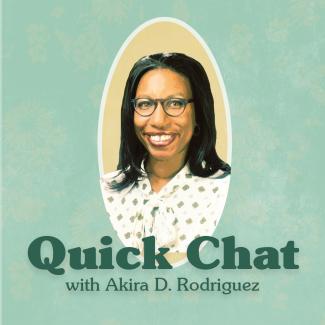
Since the beginning of the pandemic, most of the world has been staying home. While video calls have become the norm, off the cuff interactions that take place in passing have all but disappeared. So we decided to ask some of the questions you would ask if you were to run into someone at the bookstore, on the train or even while having a cup of coffee.
We caught up with Akira Drake Rodriguez, Assistant Professor at the University of Pennsylvania's Weitzman School of Design. She writes about race, cities, and space in the U.S. Her forthcoming manuscript, Diverging Space for Deviants: The Politics of Atlanta's Public Housing, examines the dialectic between black feminist politics and public housing policy in Atlanta from 1936 to 2010.
Read on to hear what Akira has been up to.
How have people living in marginalized spaces in cities been affected by the pandemic?
COVID-19 thrives in areas of vulnerability and marginalization, and much of that relates to historical policy decisions: the disproportionate siting of low-income neighborhoods in hazardous or industrialized areas; the defunding of social safety nets like basic income, food stamps, health care, education, subsidized housing; and the loss of stable wage-earning jobs and facilitation of gig economy jobs that further degrade local labor conditions. In spite of these different structural forces, we’ve seen mutual aid, protest, abolition, and logics of care return to these areas as a counter. But these networks are harder to sustain as the losses of the pandemic accumulate.
What improvements would help those living in public housing the most and why?
Safer and healthier buildings, funding to affirm a livable life in public housing developments, greater accountability and enforcement from the federal level, and less reliance on private actors and landlords to house the neediest populations. Public housing as a program and a mission has never adequately served our most vulnerable people, and its failures are nothing but an illumination of some of the broader failures of our safety net (from public schools to public health). I am glad to see Secretary Carson out of HUD, but we have decades of bad policy to reverse in order to fully and equitably serve the public housing population.
Is there a way to improve communities and raise property values without displacing those that currently live there?
Certainly, we can implement many policies to protect affordability, affirm inclusion, and see that a “rising tide lifts all boats,” as they say. I truly wish we could divorce the concept of wealth and property ownership, and look to build more sustainable institutions that do not depend on housing wealth. The ties that bind property ownership, school and neighborhood quality, and political capital are all ties to white supremacy and patriarchy, and will never lift all boats equitably. We need to de-center the role of property ownership and property rights in this country if we want to push forward with new ways of living equitably and sustainably.
Because of the pandemic, everyone has spent more time at home. What has been the best part of this time for you?
I’ve been baking and playing MarioKart. Glad we can end this on a high note.
